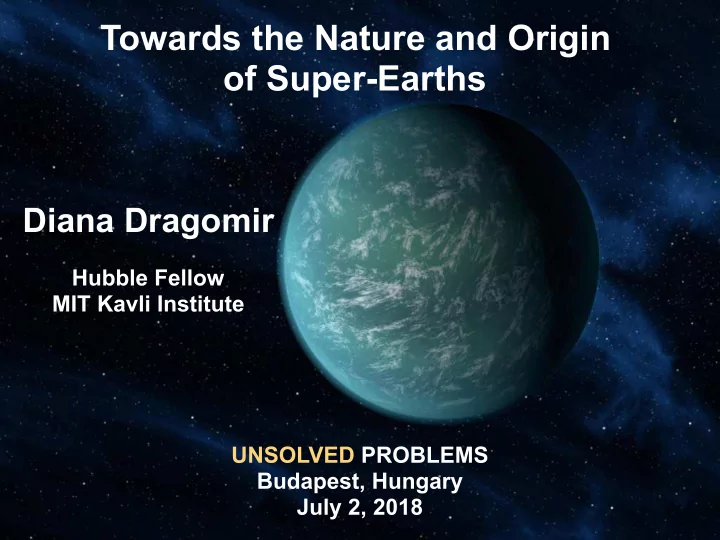

Towards the Nature and Origin of Super-Earths Diana Dragomir Hubble Fellow MIT Kavli Institute UNSOLVED PROBLEMS Budapest, Hungary July 2, 2018 Diana Dragomir Understanding Super-Earths
Small Exoplanets Are Common Sub-Neptunes Super-Earths Fulton et al. (2017) Diana Dragomir Understanding Super-Earths
How to probe vertical structure/interior of disks? Measuring turbulence is hard Uncertain chemical inventories Measuring the dust mass is hard Time evolution Diana Dragomir Understanding Super-Earths
Exoplanet Atmospheres: Transmission spectroscopy Can constrain: • scale height (how puffy the atmosphere is) • atmospheric composition • molecular abundances Diana Dragomir Understanding Super-Earths
First Challenge: Small Exoplanet Atmospheres Are Often Cloudy… GJ 3470b GJ 1214b Kreidberg et al. (2014) Ehrenreich et al. (2014) M dwarf host stars GJ 436b HD 97658b Knutson et al. (2014) Knutson, Dragomir et al. (2014) Diana Dragomir Understanding Super-Earths
… But Not Always HAT-P-11b Wavelength (µm) Fraine et al. (2014) 6 0.078 0.078 CO 2 , 5 CO 0.076 0.076 H 2 O 4 3 Transit Depth (R p /R * ) K dwarf host stars 0.074 0.074 H 2 O Scale Height H 2 O CH 4 2 H 2 O 0.072 0.072 1 Cloud 0 0.070 0.070 HAT-P-26b -1 -2 0.068 0.068 Wakeford et al. (2017) WFC3 G102 IRAC 3.6 -3 STIS 750L WFC3 G141 IRAC 4.5 0.066 0.066 -4 0.4 0.5 0.6 0.8 1.0 1.5 2.0 2.5 3.0 3.5 4.0 5.0 .4 .4 .5 .5 .6 .6 .7 .7 .8 .9 1 .8 .9 1 1.5 1.5 2 2 2.5 2.5 3 3 3.5 3.5 4 4 5 5 Wavelength (µm) Wavelength (µm) μ Diana Dragomir Understanding Super-Earths
Do Clouds/Hazes Correlate With Planet Temperatures? Crossfield & Kreidberg (2017) see also Stevenson (2016) Diana Dragomir Understanding Super-Earths
Other Challenges for Transmission Spectroscopy Only probes day-night terminator Cloudy Annulus Warm Neptune Clear Annulus 10 bar Radius Morning Global Terminator Partial Clouds vs. 0.01mbar 0.01mbar Mean Molecular Weight Cloud Cloud Clear Solar Global 0.01 mbar Cloud Solar Line & Parmentier (2015) Patchy Cloud Solar Clear High MMW Global 1 mbar Cloud Solar Degeneracy between molecular abundances Rp/Rs ? R 0 and reference pressure Heng & Kitzmann (2017) Diana Dragomir Understanding Super-Earths
Other Paths: Emission Spectroscopy Can constrain: • the temperature - pressure profile, and thus the atmospheric structure • heat redistribution efficiency • atmospheric composition Diana Dragomir Understanding Super-Earths
The first emission spectrum of a super-Earth (55 Cnc e) Dragomir et al. (2018) Diana Dragomir Understanding Super-Earths
Transiting Exoplanet Survey Satellite (TESS) 10 6 Full-Frame Images 2x10 5 Target Stars 10 5 17k 10 4 Detections 3k 10 3 1111 510 ± 122 486 ± 22 10 2 70 67 ± 9 ± 8 10 1 Earths Super-Earths Sub-Neptunes Giants < 1 . 25 R ⊕ 1 . 25 − 2 R ⊕ 2 − 4 R ⊕ > 4 R ⊕ Sullivan et al. (2015) Launched April 18, 2018 Diana Dragomir Understanding Super-Earths
Other Paths: Small Planet Mass-Radius Diagram 4 Hydrogen Search for trends as a function of: 3 100 % water • distance from the host Radius [R Earth ] star (orbital period) pure rock 2 Earth − like • stellar mass maximum iron fraction • stellar metallicity 1 ★ ★ and abundances Earth Venus 0 0 5 10 15 20 Mass [M Earth ] Diana Dragomir Understanding Super-Earths
Takeaways • Connecting super-Earth composition to their formation is a multi-nuanced challenge • Transmission spectroscopy is prone to degeneracies ➡ but for now it is the only way to probe the atmospheres of most (transiting) super-Earths • Use complementary approaches to enhance the efficiency of super-Earth characterization ➡ emission spectroscopy and bulk density statistics Diana Dragomir Understanding Super-Earths
Recommend
More recommend